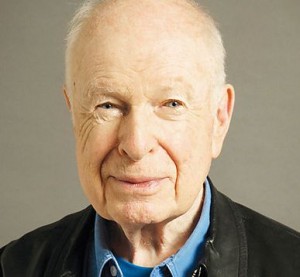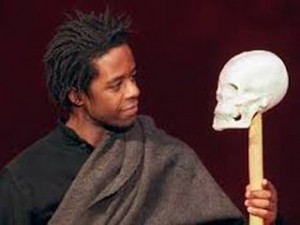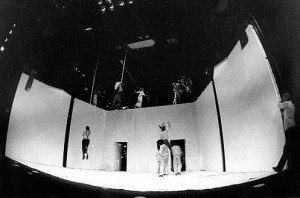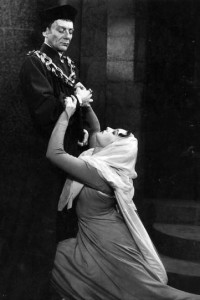 Nobody has been more influential in the world of the theatre in the last 70 years than Peter Brook. And at the age of 88, he’s still involved, setting out his ideas about why theatre is so important. Shakespeare has always been central to these concerns, and earlier this year he published a series of new essays: The Quality of Mercy: Reflections on Shakespeare.
Nobody has been more influential in the world of the theatre in the last 70 years than Peter Brook. And at the age of 88, he’s still involved, setting out his ideas about why theatre is so important. Shakespeare has always been central to these concerns, and earlier this year he published a series of new essays: The Quality of Mercy: Reflections on Shakespeare.
In the book he considers Shakespeare from a number of angles, looking at plays he’s directed such as Measure for Measure, Titus Andronicus, and, most famously, A Midsummer Night’s Dream, and at the idea that Shakespeare didn’t write his own plays.
Last week Radio 3’s Nightwaves broadcast an extended interview between Brook and Matthew Sweet in which they talked about Brook’s long and distinguished career. As Sweet points out, one of the things that distinguishes Brook is his “streak of mysticism”, and when asked about his journey with Shakespeare he immediately started to talk about our planet and our shared humanity. “Everything is energy shooting across the globe”, and we continually respond to countless influences without even realising we are doing do. Using the Shakespearian metaphor of theatre as a mirror is which actors “hold, as ’twere, the mirror up to nature”, he pointed out that the reflections in a mirror are never static, but are immediate”. The podcast is available here.
I’m going to be returning in another post to his production of Titus Andronicus, but he explains in the interview how it was his intuition that in the 1950s this most neglected of Shakespeare’s plays at last had found its time. Titus Andronicus was the last of Shakespeare’s plays to be performed in Stratford-upon-Avon, and it caused a sensation. Interestingly Brook comments that the comfy, tasteful world of the West End was already being challenged by John Osborne’s play Look Back in Anger, but in fact his production of Titus Andronicus was staged in Stratford-upon-Avon in August 1955, a full nine months before Osborne’s play was premiered at London’s Royal Court in May 1956.
Brook’s work at Stratford-upon-Avon dated back to 1946, when as a precocious 20-year old he had directed a playful and enormously successful Love’s Labour’s Lost. The following year his Romeo and Juliet met with less approval, but in 1950 he undertook Measure for Measure, with John Gielgud, a production which has gone down in history. In the interview with Sweet, he talks about how this play is full of meaning today: Shakespeare’s preoccupations in the play are with the balance between the need for order, the desire for freedom and the fear of tipping into chaos.
Brook’s next Stratford production was Titus Andronicus, followed in 1957 by The Tempest, again with John Gielgud. In 1962 he directed King Lear, another triumph, followed by a more low-key Tempest in 1963. From 1963-1966 Brook worked on a number of experimental productions in London for the RSC including the Theatre of Cruelty season and the Marat-Sade, showing the influence of Artaud, Brecht and Grotowski. Shortly afterwards he wrote his book The Empty Space in which he articulated his theories about theatre and staging, and it was just after this that his most definitive work, his 1970 production of A Midsummer Night’s Dream, was produced. The Guardian have recently published a piece by Brook about this production, and John Wyver, of Illuminations, has written a blog post about the effect this production had on him as a sixteen-year old. This also includes a link to a clip from the play which was made for a BBC documentary.
Since the early 1970s Brook has worked largely outside the UK, especially at his theatre in Paris, the Bouffes du Nord, but he’s also worked in Africa and Asia where he’s explored traditional performance forms. His production of The Mahabharata in the late 1980s resulted from this exploration. He came back to Stratford to direct Antony and Cleopatra in 1978, the only one of his Shakespeare productions that I saw, and sadly the one that was probably the least successful.
 In 2000 his production of Hamlet at the Bouffes du Nord, repeated at the Young Vic in 2001, featured Adrian Lester (the National Theatre’s current Othello) in a production “presented with rigorous simplicity”.
In 2000 his production of Hamlet at the Bouffes du Nord, repeated at the Young Vic in 2001, featured Adrian Lester (the National Theatre’s current Othello) in a production “presented with rigorous simplicity”.
Although Brook doesn’t feel the desire to direct another major production of Shakespeare it’s clear his enthusiasm is undiminished. In his new book he explains “The uniqueness of Shakespeare is that while each production is obliged to find its own shapes and forms, the written words do not belong to the past. They are sources that can create and inhabit ever new forms… There is no limit to what we can find in Shakespeare”.



